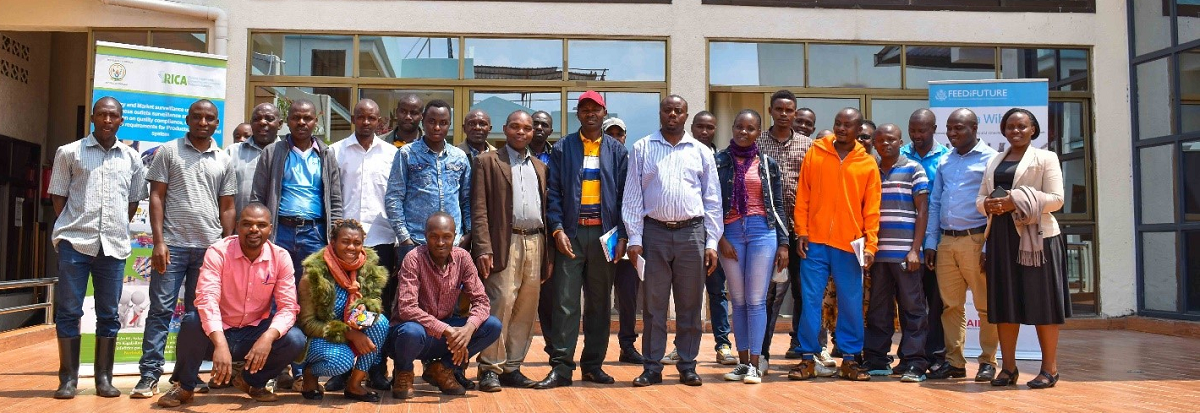Improving Meat Safety in Rwanda
Image

Demand for meat has been growing in Rwanda and is likely to rise further as the country becomes increasingly urbanized and more affluent. However, meat safety remains a challenge. A 2021 quality inspection of 44 slaughterhouses and 152 meat retail shops by the Rwandan government revealed that only 27 percent of medium and large businesses met the “gold” standard, whereas none of the smaller operators were able to meet this standard. The majority of these (90 percent) fell into the appropriately named “gray” standard, with very low compliance characterized by poor animal and meat handling, limited documentation and record keeping, poor pest control and waste management measures, among other key findings. Armed with this data, the Feed the Future Orora Wihaze Activity — a five-year livestock market systems activity — partnered with the Rwanda Inspectorate, Competition, and Consumer Protection Authority (RICA), which regulates and inspects Rwanda’s meat industry to improve meat hygiene standards and reduce food-borne illnesses dramatically — protecting Rwanda’s consumers from unsafe food through a private sector engagement approach.
Although the percentage of stunted children under the age of five dropped from 38 percent in 2015 to 33 percent in 2022, the Rwanda Demographic and Health Survey shows that 36 percent of children in rural areas were stunted, compared to only 20 percent in urban areas. Land O’Lakes Venture37 — in collaboration with Catholic Relief Services, Market Share Associates, the Manoff Group, and Urunana — have been improving both the production and consumption of animal-sourced foods in Rwanda since 2019 through the Orora Wihaze Activity.
As rural producers, slaughterhouses, and rural meat slabs increase processing, hygiene remains a problem in Rwanda. A recent study conducted by Orora Wihaze identified the following constraints:
- Limited practical knowledge and skills gaps among meat inspectors and vets based in the districts;
- Lack of appropriate infrastructure and equipment to perform meat inspection pre- and post-slaughter;
- Inadequate application of food safety measures and procedures [Good Manufacturing Practices (GMP), Prerequisite Program (PRP), and Hazard Identification Assessment and Control (HACCP)];
- Producers’, transporters’, retailers’, and consumers’ lack knowledge of meat hygiene standards and practices;
- Lack of efficient transportation of fresh and chilled meat; and
- Inadequate research and extension programs in the production, processing, and marketing of meat.
Since Orora Wihaze aims to encourage more vulnerable households — and especially expectant mothers and children under the age of five — to consume more animal-sourced foods to boost their nutrition, part of the activity’s approach focuses on increasing the availability of trusted, safe, and quality animal-sourced foods in local markets. At the enterprise level, the activity helps slaughterhouses and animal-sourced foods retailers increase their sales and invest in and use improved meat safety and handling techniques.
Though meat hygiene standards have been well established by the Rwandan government, few of the smaller slaughterhouses were aware of hygiene requirements. RICA also identified a need to improve the skills of district meat inspectors to strengthen the enabling environment so that standards are understood. Further, RICA wanted to ensure that consumers trust the quality and safety of animal-sourced foods sold throughout Rwanda. Orora Wihaze worked with RICA, Rwanda Food and Drug Authority, Rwanda Bureau of Standards and Rwanda Agriculture Board (RAB) to co-design a program to support a public-private partnership that will bring about systemic change in this sector through cooperation with animal-sourced foods actors (slaughterhouses, butchers, and transporters) to adopt practices aligned with RICA’s meat safety standards, thereby improving food safety. Subsequently, Orora Wihaze contracted a meat hygiene specialist to conduct a study to map key stakeholders in eight districts and design a training manual on meat quality and hygiene practices.

In March 2022, RICA conducted a validation workshop with participants from the public and private sector actors such as meat inspectors, slaughterhouse personnel, and law enforcement to preset technical regulations governing the inspection of fresh meat. During the same month, Orora Wihaze, RICA, and other stakeholders — including the African Development Bank-funded Meat Competitiveness Project under the Ministry of Trade and Industry, Partnership for Resilient and Inclusive Small Stock Market supported by the Belgian government (ENABEL), and International Fund for Agricultural Development) — organized and conducted a national meat safety and quality campaign and held a discussion with key actors to share strategies to increase quality meat production to meet both local and export markets' requirements and demand. In August, twenty stakeholders from government and private institutions convened to provide feedback on the manual and agree upon a course of action. This followed a three-day training of trainers with 16 participants from Rwanda Agriculture board (RAB), Rwanda Food and Drugs Authority (RFDA), Rwanda Standard Board (RSB), Rwanda Council of Veterinary Doctors (RCVD) and RICA, who are collectively responsible for meat inspection in various facilities and slated to train meat supply chain actors. In early September, representatives from multiple government agencies trained 263 Meat Actors (slaughterhouses, butchers, and meat transporters) in eight districts targeted by Feed the Future.
The activity also plans to support some of the slaughterhouses that adopted improved practices with small-scale grants to purchase relevant equipment to enhance meat hygiene, animal handling, lairage, slaughter techniques, cold chain, among others. RICA is also interested in enhancing its meat inspection services and launching a consumer awareness campaign related to its work and a seal of approval for slaughterhouses, butchers, and transporters that meet the gold standard.
The task to improve meat hygiene, especially small-scale slaughterhouses in remote rural areas, is not an easy one, but one with enormous importance if this intervention can help small-scale producers obtain a yellow or gold rating. Rwanda benefits from a strong enabling environment with active participation and dedication by the government to enforce standard and regulatory compliance. They will rely upon a team of licensed private meat inspectors that will support enforcement. Indeed, there will be a cost for compliance, but this is vital to gain consumer trust in the quality and safety of meat hygiene for all segments of society.


